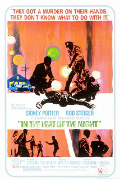
Directed by
Norman Jewison
109 minutes
Rated M
Reviewed by
Bernard Hemingway


In The Heat Of The Night
Rod Steiger won Best Actor at the Oscars for his performance as the redneck police chief, Gillespie, although rather surprisingly the man who matched blows with him for the duration of the film, Sidney Poitier, didn't even get nominated. The film itself won Best Picture Oscar along with Best Screenplay for Stirling Silliphant and Best Editing for Hal Ashby. With Jewison doing his best work, fluid cinematography by Haskell Wexler and a title song sung by Ray Charles and a cool blues score by Quincy Jones there is little to stop this being classified as a 60s classic bar the rather twee ending.
The film which was an early instance of a non-white actor in a leading role (indicative of the changing times Poitier also starred in Guess Who's Coming To Dinner and To Sir With Love both released the same year) and significant addition to the "social conscience" group of films of the period was based on the 1965 novel of the same name by John Ball and tells a story of racial prejudice in The Deep South, The bigotry depicted is frightening and apparently so close to actuality that it was filmed in Sparta, Illinois. The dead body of a Chicago industrialist who has come to build a build a factory in the town, one which would mean jobs for the struggling town but for blacks as well as whites is found beaten to death in an alley by Officer Woods (Warren Oates in a first class performance as a dumb-ass hick) on his night rounds. Coincidentally Virgil Tibbs (Poitier) happens to waiting at the train station and Woods picks him up. There then ensues a power struggle between Gillespie and Tibbs vies for dominance during the murder investigation. The film works quite well as a thriller as first one then another suspect turns out not to be the killer although there are some rather insistent plot weaknesses (for instance Tibbs was in town to visit his mother, so how come he tells Jess the mechanic that he doesn’t have anywhere to stay?). The real strength of the film however is its punishing depiction of the Southern White Supremacist mentality and the fine performances by Steiger and Poitier based on Silliphant's excellent script.
BTW: Two sequels were made with Sidney Poitier as Virgil Tibbs in They Call Me Mister Tibbs! (1970) and The Organization (1971), although without the Deep South setting
Want something different?





